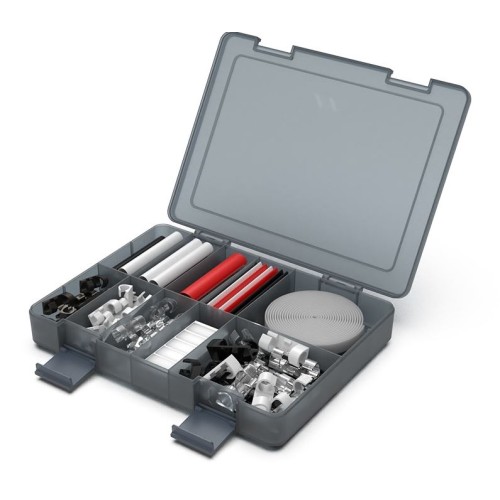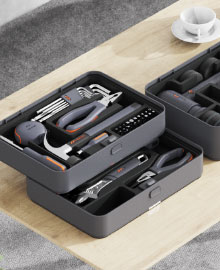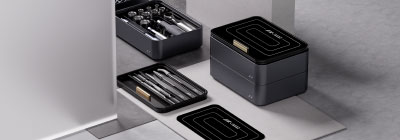
A complete toolbox is a maker's top resource for essential work like checking wood and driving screws with precision. This primer offers guidance to choose appropriate tools and utilize them skillfully.
- Initiate your toolkit by collecting essential hand tools like a hammer, screwdrivers, wrenches, pliers, saws, and tapes.
- Become familiar with tool functionality and the unique contexts where they apply.
- Hone skills with practical projects and steadily raise task difficulty.
Remember, investing time in mastering hand tools is an investment in your craftmanship. With adequate know-how, tools will amplify your capacity to tackle demanding tasks with accuracy.
Boost Project Efficiency with Power Tools
Aiming to improve workflows? Investigate power tools that bring together accuracy and effectiveness. These indispensable devices can reshape how you work, for pros and hobbyists alike. From all-purpose drills to specialized saws, power tools encompass a wide range for construction and repair.
- Explore cordless impact drivers to simplify fastening and dismantling tasks.
- Master reciprocating saws for quick and clean cuts through wood, metal, and more.
- Boost woodcraft quality with high-power planers and jointers for accurate finishing.
Implement power tools to reduce build time and boost quality of results.
Accuracy Made Accessible
When detail is crucial, the right measuring gear alters quality considerably. From basic rulers to professional laser devices, measurement equipment empowers precise design execution. Whether practiced craftsman or novice DIYer, command of these tools broadens achievable projects.
- Uncover the broad assortment of measuring tools for different applications.
- Absorb the uses and benefits tied to every variety of measuring device.
- Refine abilities in accurate measurement and proper implementation.
Kits Tailored to Every Project
Professional or enthusiast, the ideal set of tools is fundamental to project execution. In jobs from screwwork to furniture assembly, a proper set ensures efficient, safe and accurate results. To pick an ideal toolset, assess the types of tasks you'll perform regularly.
Should you opt for an extensive set or a more targeted kit? Once you've determined your requirements, explore different brands and models to compare features, quality, and price. Check online user reviews to obtain helpful input before finalizing your selection.
By investigating and planning, pick the perfect toolkit to handle jobs with certainty.
Tool Upkeep: Keep Your Hand Tools Performing
Maintaining proper care of hand tools matters for every woodworker or DIYer. Ignoring maintenance causes blunt blades, damaged components and frustrating outcomes. Regular maintenance ensures your tools remain in top shape, providing you with years of reliable service. Begin with wiping and cleaning tools post-use to clear grime and particles. Store them in a dry place to prevent rust and corrosion.
- Keep blades sharp by using a whetstone or file on a regular basis.
- Oil moving components with suitable lubricant to minimize friction and wear.
- Look over handles for defects or breaks and change out as needed.

Observing these care recommendations extends tool life and results in better, more efficient work.
Key Hand Tools for Your Workshop
A thoroughly equipped workshop is ideal for DIY enthusiasts and craft hobbyists. While unique tools assist, essential hand implements are fundamental to many projects. Core choices include a trusted hammer, adjustable wrench and reliable tape measure for precision measuring. Stock multiple screwdriver types, pliers for gripping tasks and a utility knife for material cutting. A high-quality saw offers precise cuts and a level keeps work straight and balanced.
- Core Tools for Your Home Workshop

Power Tool Safety Essentials: A Full Guide
Power tools are potent machines offering strong performance and time savings. Nevertheless, they require full comprehension of safety standards. Not following precautions can yield serious injury outcomes. This handbook clarifies safety for power tool use and provides practices to work safely.
Kick off by learning your tools—read manuals thoroughly and absorb the specific safety features. Always put on correct PPE such as safety goggles, ear protection and gloves. Inspect and service tools routinely to verify reliable operation.
Never forget safety is essential in the shop. By following these guidelines, you can work with power tools safely and confidently.
Choosing the Right Tools for Accurate Measurement
For securing exact measurements, the instruments you choose matter greatly. A diversity of measuring devices is offered, each purpose-built for specific needs. Comprehending measurement tool traits is vital for proper choice. Consider elements like accuracy, resolution and scale when picking the appropriate measuring tool.
- For accurate length measurements, a ruler or tape measure is typically used.
- To determine angles correctly, rely on a protractor.
- Electronic calipers offer ideal capabilities for tiny dimension measurement.
Thoughtful selection of measuring devices leads to accurate and reliable measurements.
Selecting the Ultimate Toolkit

Beginning the search for an ideal tool set is both exciting and challenging. A broad selection of choices can make selection feel daunting. This wide-ranging guide offers advice to pick the perfect tool set for your needs.
Firstly, identify the project kinds you'll be engaging in. Are you skilled or just beginning? Clear objectives guide the selection process.
- Blend both tool types where appropriate to maximize productivity and precision Don't be afraid to combine blend utilize both power and hand tools for a successful productive efficient outcome Blend both tool types Hand Tools where appropriate to maximize productivity and precision
- Give precedence to core necessary tools
- A dependable hammer and optional mallet or sledgehammer
- A comprehensive screwdriver, wrench and plier set is fundamental
- Tape measure and ruler for accurate measures
- Use a level, plumb bob or transit for accurate alignment
Additional factors to weigh are tool materials, budget limits and brand standing. Keep in mind a durable toolkit is a long-term investment.
Practical DIY: Use Tools Effectively
Starting out on a DIY project can feel like a big step. Still, armed with the right tools and knowledge, tough projects become manageable. Start by familiarizing getting to know learning about your tools. Study the manuals and practice basic techniques in a controlled, safe setting. Always prioritize safety as your first consideration. Equip protective items like goggles, gloves and ear defenders to protect from hazards.
When picking tools, emphasize long-lasting quality and robustness. Buy from dependable brands that provide durability and longevity.
Seek advice from experienced DIYers or store professionals when unsure. Store pros and experienced DIYers can share practical suggestions and insights for picking ideal tools.
- Sharp tools enhance safety and accuracy—keep them well-sharpened.
- Organize and store tools to prevent damage and ensure longevity.
- Experiment with new DIY challenges to improve skillset
Choosing Power Tools vs. Hand Tools: When to Use Each
Facing a household or workshop job? Choosing power vs hand tools can pose a tricky dilemma. While powerful robust heavy-duty power tools offer speed and efficiency, classic hand tools remain essential valuable indispensable for precise work and smaller jobs. This breakdown helps you select the right tool type for your specific job.
- Hand tools are well-suited for fine detail work, careful assembly and delicate repairs. These tools offer heightened control and usually come at a lower cost.
- When speed is key—cutting, drilling or sanding—power tools deliver quick, efficient results. They can significantly dramatically substantially reduce time effort labor.
In the end, tool selection hinges on the specific task, your skill set and available budget. Mixing hand and power tools often yields the best, most efficient outcomes.
